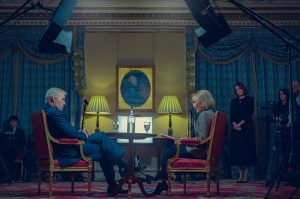If occasionally enjoying a sappy romcom is wrong, I don’t want to be right. That’s why I was thrilled when my boyfriend agreed to watch Netflix’s Purple Hearts with me last week. (In exchange, I avoided side-eyeing how many bourbons he had throughout the ordeal.)
The premise of the movie, without giving too much away, is that Cassie wants to wed a Marine so that she can take advantage of spousal healthcare benefits. Cassie was recently diagnosed with diabetes, you see, and cannot afford her insulin. Meanwhile Luke, the enigmatic Marine, has his own reasons for agreeing to a fake marriage.
Like most films in the genre, Purple Hearts requires you to suspend disbelief quite a bit. But Cassie and Luke have great chemistry and it’s wildly entertaining to see the pair spar over the different ways in which they view the world. Cassie is probably best described as a social justice warrior, while Luke is more traditional and patriotic, but both discover that many of the assumptions they make about one another are based on false stereotypes and misconceptions.
Naturally, the woke left is sounding-off online about how much they hate the movie. According to the mob, Purple Hearts is jingoistic military propaganda because it humanizes troops. Cassie, the outspoken Latina feminist, has degraded herself by relating to, let alone falling in love with, a white Marine. Much of the criticism focuses on a scene where Cassie goes off on one of Luke’s friends, Armando, who raises a toast to “hunting down some goddamn Arabs” ahead of the group’s deployment. The movie makes clear the comment is out of line — the room gets quiet and the other Marines roll their eyes at the statement. However, Purple Hearts also makes the point that political correctness doesn’t win battles.
“It’s all bullshit bravado,” Luke tells Cassie. “And look, Armando is a dick. But I don’t think you understand what we’re preparing ourselves to go and do.”
The movie is filled with similar moments where nuance reigns supreme. Cassie suggests Armando doesn’t know who his enemy is, but she doesn’t know hers either; she resents the Marines, though her real issue is with the military-industrial complex and the foreign policy decisions made by the US government. Luke accuses Cassie of being a freeloader, despite his own history of stealing from family members to fund a drug addiction. At the very least, you’d think the angry progressives would appreciate that Purple Hearts doesn’t ever try to sugarcoat Cassie’s struggles in the US healthcare system.
By no means does Purple Hearts handle politics perfectly, but at least it attempts to insert some complexity into its world and characters. That’s more than a lot of rom-coms aim to accomplish, and it makes for a far more interesting watch than a make-believe land of black and white, good versus evil.
Sofia Carson, the rising Hollywood starlet who plays Cassie, responded to the criticism (and thankfully, didn’t offer an apology).
“Why I fell in love with the movie is that it’s a love story but it’s so much more than that. It’s two hearts, one red, one blue, two worlds apart, who are really raised to hate each other,” Carson explained. “Through the power of love, they learn to lead with empathy and compassion and love each other and turn into this beautiful shade of purple.”
This is near-perfect messaging for post-woke Netflix. The streaming service recently changed course after posting dismal subscription numbers, opting to cancel some of its identity-centric programming and double-down on airing wildly popular but non-politically correct stand-up comedy specials. Netflix warned staff who had a problem with their commitment to “content breadth” to find employment elsewhere. Purple Hearts‘s melding of left and right feels like an important reminder to viewers that Netflix is, at least for now, done taking sides. Despite the woke consternation, audiences love this approach to entertainment. Purple Hearts broke Netflix’s weekly streaming record for 2022 with over 100 million hours watched in its second week on the platform.


















